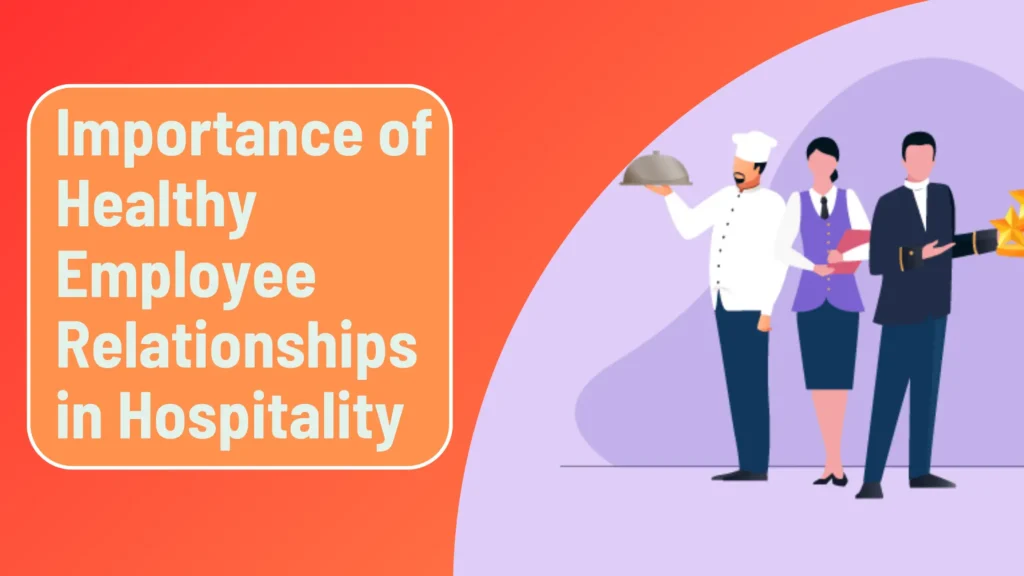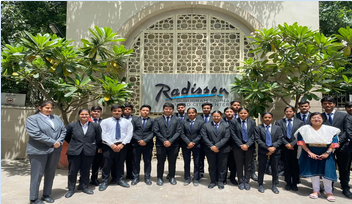

IMPORTANCE OF HEALTHY EMPLOYEE RELATIONSHIPS IN HOSPITALITY
September 05, 2023
Introduction
In the hospitality industry, where customer satisfaction is paramount, the internal dynamics between employees can’t be overlooked. Strong relationships built on trust, respect, and effective communication are foundational elements that not only boost employee morale but also contribute to retention and job satisfaction.
In an industry characterized by long working hours, high-pressure situations, and intensive customer interactions, healthy employee relationships in the hospitality industry can be a make-or-break factor for your business.
Importance of Healthy Employee Relations in the Hospitality Industry
Healthy relationships among employees are not just an HR buzzword; they are an essential component of a thriving hospitality business. Positive working conditions lead to increased productivity, lower turnover rates, and a more harmonious workplace, which indirectly contribute to customer satisfaction.
Key Elements of Healthy Employee Relationships
Mutual Respect and Trust: Pillars of Strong Employee Relationships
In a bustling hotel or a busy restaurant, mutual respect and trust are critical. Employees are more likely to go above and beyond when they feel valued and trusted by their peers and supervisors.
Effective Communication: Bridging Gaps and Building Connections
Clear, transparent communication is crucial in fast-paced hospitality settings. Effective communication can solve problems before they escalate, fostering a more collaborative environment, whether it’s between front-desk staff and housekeeping or kitchen staff and waiters.
Recognition and Appreciation: Boosting Morale and Engagement
A simple ‘well done’ or ‘thank you’ can go a long way. Recognizing and rewarding employees’ hard work boosts morale, keeps employees engaged, and increases productivity.
Nurturing Healthy Employee Relationships: Strategies for Hospitality Businesses
Providing Growth Opportunities: Employee Development in Hospitality
Invest in your employees by offering career development opportunities. This can range from cross-training in different departments to sponsoring further education courses. Explore our courses to know more.
Work-Life Balance: Sustaining Well-being in a Demanding Industry
The nature of the hospitality industry can take a toll on employees’ personal lives. Implementing flexible schedules and encouraging time off can greatly improve work-life balance, subsequently improving workplace relationships.
Conflict Resolution: Managing Challenges Constructively
Conflicts are inevitable in any workplace. Encourage an open atmosphere where employees can voice concerns without fear of retaliation. Proper mediation and conflict resolution strategies should be in place.
Strategies for Fostering Healthy Employee Relationships
Implementing Supportive Leadership
Leadership plays a pivotal role in setting the workplace culture. Approachable managers who provide regular feedback and clear expectations lay the groundwork for a positive working environment.
Team-building Activities
Team-building exercises can significantly enhance workplace culture. Consider activities like collaborative cooking challenges or outdoor retreats that can be particularly relevant to the hospitality industry.
Work-Life Balance Initiatives
Offering fitness programs or stress-relief activities can significantly reduce workplace stress, subsequently improving employee relationships.
Conflict Resolution Mechanisms
A strong HR department should have mediation and conflict resolution mechanisms in place.
Training and Development
From onboarding programs to continuous skill-upgrade workshops, investing in training significantly boosts morale and job satisfaction.
Real-life Examples of Successful Employee Relationship Practices
Successful chains like Marriott and Hilton are EXCELLENT CASE STUDIES that show the value of investing in employee relationships. Their focus on employee satisfaction and engagement has made them industry leaders, not just in revenue but also in employee and customer satisfaction.
The Ripple Effect: How Healthy Employee Relationships Impact Guest Experiences
Your employees are the face of your business. A team that communicates effectively respects each other, and works well together will naturally provide better customer service. Happy employees lead to satisfied customers—it’s as simple as that. In conclusion, the importance of healthy employee relationships in the hospitality industry is an often underemphasized asset that can yield tangible benefits.
From increased employee morale and job satisfaction to higher levels of customer service, the upsides are endless. Implementing strategies for fostering positive relationships should be a business imperative. CLICK HERE to find out how our courses can facilitate this for you.


